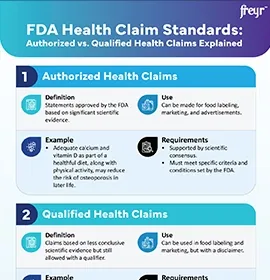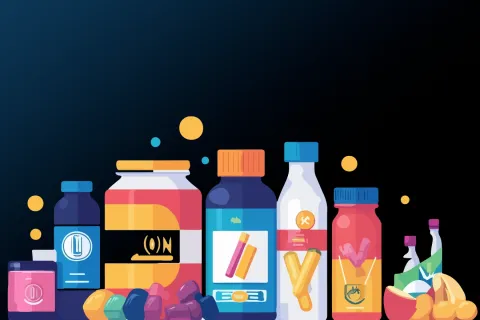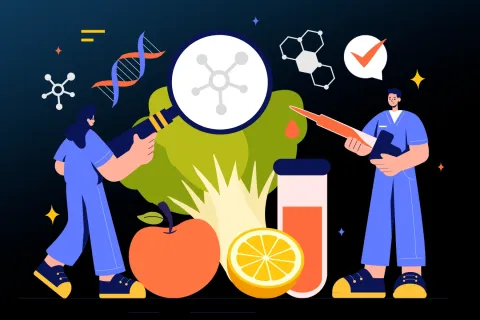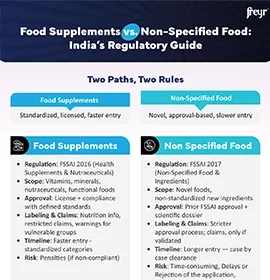EUDR Compliance in 2026: The Ultimate Guide for Food & Food Supplement Companies
Browse Topics
EUDR 2026: What Food & Supplement Companies Need to Know Now
Companies in the food and dietary supplements industry must prepare to align with the European Union’s Deforestation Regulation (EUDR). With enforcement beginning in December 2026 for large businesses, it is essential to ensure that ingredients such as cocoa, coffee, soy, and palm oil are fully traceable and verified deforestation‑free. Whether you are a brand owner, importer, or private label manufacturer, EUDR compliance services are vital not only to meet legal obligations but also to safeguard market access, protect brand reputation, and meet rising consumer expectations for sustainability.

What is the EU Deforestation Regulation (EUDR)?
The EU deforestation regulation aims to reduce global deforestation and forest degradation. It restricts the sale of certain commodities and products in the EU unless they meet specific criteria:
Deforestation-Free:
Products must not be linked to deforestation or forest degradation.
Legally Produced:
Must comply with the relevant legislation of the country of production.
Due Diligence Statement:
Companies must provide a due diligence statement confirming compliance.
The regulation applies to commodities such as:

Cattle

Cocoa

Coffee

Oil Palm

Rubber

Soy

Wood
It also covers products derived from these commodities, including:

Chocolate

Vegetable Oils

Leather

Paper Products

Furniture

Why is EUDR important?
The EUDR significantly impacts the FDS industry due to the widespread use of ingredients like cocoa, coffee, and palm oil. Non-compliance can result in:
- Market Access Restrictions: Products may be banned from the EU market.
- Financial Penalties: Fines up to 4% of annual turnover.
- Reputational Damage: Loss of consumer trust and brand value.
The regulation also introduces a benchmarking system that categorizes countries into low-, standard-, or high-risk tiers, affecting EUDR risk assessment processes.
Key Compliance Requirements
To comply with the EUDR, FDS companies must:
- Conduct EUDR Due Diligence: Assess and mitigate risks of deforestation and forest degradation in their supply chains.
- Maintain Traceability: Ensure all products can be traced back to their source, verifying they are deforestation-free.
- Submit Declarations: Provide due diligence statements to the EU registry, confirming compliance.
- Implement Risk Mitigation Measures: Address any identified risks through appropriate actions.

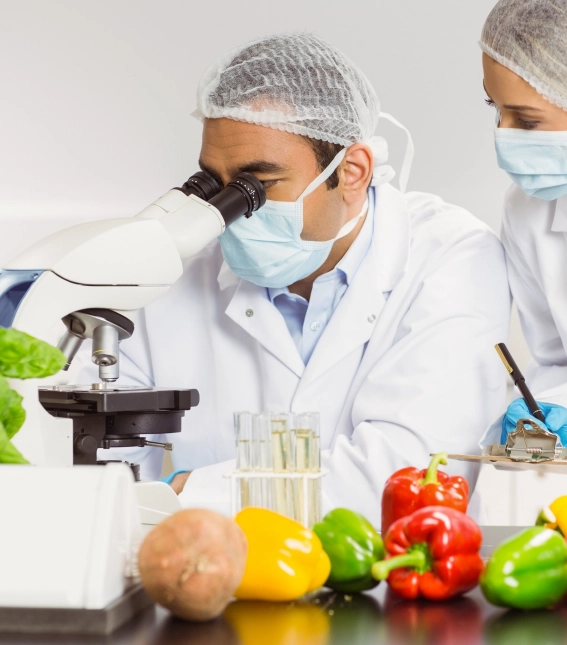
Implementing EUDR Compliance: A Step-by-Step Framework
Follow a structured approach using an EUDR compliance checklist:
- Identify and Analyze: Accurately identify products within EUDR's scope and map your entire supply chain.
- Engage Suppliers: Collaborate with suppliers to obtain necessary documentation and data.
- Implement Traceability Systems: Utilize systems to track and verify the origin of ingredients.
- Train Staff: Ensure all relevant personnel are educated on EUDR requirements.
- Regular Audits: Conduct periodic checks to ensure ongoing compliance.
Technological Tools for Compliance
Digital tools can simplify your EUDR compliance services:
AI and Satellite Data:
Tools like TRACT and Rainforest Alliance use AI to monitor and verify supply chains.
Traceability Platforms:
Platforms such as Forest IQ assist in tracking product origins and assessing deforestation risks.
Data Management Systems:
Implement systems to store and manage compliance-related data efficiently.
EUDR Compliance Timeline
| Entity Type | Compliance Deadline |
|---|---|
| Large Companies | December 30, 2026 |
| Small and Micro Enterprises | June 30, 2027 |
How Can Freyr Help?
Freyr offers comprehensive EUDR compliance services tailored to the food and dietary supplement sectors. Services include:
- Regulatory scope analysis
- Ingredient mapping
- Supplier coordination and documentation
- Technology integration for traceability
- Development of internal protocols and EUDR compliance solutions
Freyr also provides specialized EUDR compliance services for food industry players, including support with creating and managing EUDR due diligence statements.


Overcoming Key Industry Challenges
The journey to EUDR compliance can be complex for food and dietary supplement (FDS) companies. From intricate supply chains to sourcing from high-risk regions, there are several hurdles to navigate. Here’s how to overcome the most common challenges:
- Complex Supply Chains
Challenge: With ingredients sourced globally, tracing their origins can be difficult, especially when dealing with multiple suppliers and regions.
Solution: Map your supply chain thoroughly. Engage with suppliers early to secure traceability data, certifications, and compliance documents. Using tools like traceability platforms or third-party certifications can simplify the process. - Sourcing from High-Risk Regions
Challenge: Ingredients from countries with high deforestation rates or weak environmental enforcement pose significant compliance risks.
Solution: Assess country risk based on EUDR’s benchmark system. Stay updated on regional deforestation rates and engage with local authorities or NGOs to manage sourcing risks effectively. - Lack of Traceability Systems
Challenge: Smaller companies may struggle with traceability, especially if they lack the technology to track ingredients back to their source.
Solution: Invest in traceability technology such as blockchain or satellite monitoring systems. These tools can ensure transparency and verify the deforestation-free status of your products. - Insufficient Documentation
Challenge: Maintaining the required due diligence statements and compliance documentation can be a logistical challenge.
Solution: Centralize compliance management. Create a system for organizing and updating documents like due diligence statements, supplier agreements, and certifications to streamline the compliance process. - Resistance to Change
Challenge: Some suppliers or internal teams may resist new compliance measures or be unfamiliar with EUDR requirements.
Solution: Provide training and education. Equip your team and suppliers with the knowledge they need to understand and implement EUDR regulations effectively.
Key Sustainability Trends
Sustainability is becoming increasingly important in the food and dietary supplement (FDS) sector. As EUDR compliance aligns with these broader sustainability trends, here are key shifts shaping the industry:

- Consumer Demand for Transparency
Trend: Shoppers now expect transparency in sourcing and production practices.
Impact: EUDR compliance directly addresses this demand, allowing companies to showcase their deforestation-free status and build consumer trust. - Green Certifications and Eco-Labeling
Trend: Eco-certifications like Fair Trade and Rainforest Alliance are gaining popularity as consumers prioritize ethical sourcing.
Impact: EUDR compliance complements these certifications. By adopting them, companies can enhance their reputation and appeal to sustainability-conscious consumers. - Plant-Based and Sustainable Sourcing
Trend: There’s a growing shift toward plant-based ingredients, which are seen as more environmentally friendly alternatives.
Impact: Sourcing plant-based ingredients aligns with the EUDR’s goal of reducing deforestation, particularly in high-impact sectors like soy and palm oil. - Circular Economy and Sustainable Packaging
Trend: Companies are adopting sustainable packaging solutions to reduce waste and environmental impact.
Impact: By aligning packaging practices with sustainable sourcing, companies can ensure that their products are fully EUDR-compliant while appealing to eco-conscious consumers. - Corporate Social Responsibility (CSR)
Trend: FDS companies are integrating CSR strategies into their core business models, focusing on environmental and social responsibility.
Impact: EUDR compliance strengthens CSR efforts by ensuring that sourcing practices are responsible and align with broader environmental goals. - Technological Innovation for Sustainability
Trend: Technologies like AI, blockchain, and satellite monitoring are enabling companies to track their supply chains more effectively.
Impact: By adopting these technologies, companies not only meet EUDR requirements but also contribute to the overall sustainability of their operations.

The Path Forward: EUDR Compliance in 2027 and Beyond
With enforcement beginning December 30, 2026 for large and medium operators and June 30, 2027 for small and micro‑enterprises, EUDR compliance is more than a regulatory obligation — it is an opportunity to strengthen sustainability leadership. By following the steps outlined in this guide, you can build a deforestation‑free supply chain, reduce risk exposure, and meet rising consumer demand for eco‑conscious products.
Now is the time to evaluate your supply chain, collaborate with suppliers, and implement robust traceability systems. Preparing ahead of enforcement ensures your brand is positioned for long‑term success in the EU market and beyond, while protecting market access, reputation, and consumer trust.






